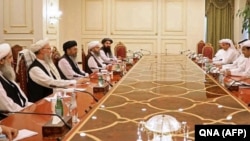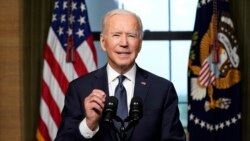On April 14, the U.S. President Joe Biden announced that the withdrawal of the 2,500 U.S. troops in Afghanistan would start on May 1 and be completed by the anniversary of the September 11, 2001, terror attacks on New York City and Washington, D.C.
“We’ll hold the Taliban accountable for its commitment not to allow any terrorists to threaten the United States or its allies from Afghan soil,” Biden said in his historic announcement.
But since Biden’s announcement, Afghan officials say the Taliban has launched attacks that took the lives of hundreds of government security forces, civilians and Taliban insurgents.
Citing Afghan security officials, Reuters reported that in the first 15 days following the announcement, the Taliban planted 65 roadside bombs, launched six suicide attacks and carried out several targeted killings.
In a string of tweets, Taliban spokesman Mohammad Naeem conveyed a statement by Mullah Abdul Ghani Baradar, the group’s co-founder and deputy leader, saying that it is committed to peace and the rights of women and minorities within Islamic law.
"Our very participation in the negotiations and its support on our part indicates openly that we believe in resolving issues through (mutual) understanding,” Baradar’s statement read.
But given the violence, perpetrated by Taliban and sympathizers, that is misleading. Rather than search for common ground, the Taliban have rushed to seize territory.
The Associated Press reported on June 22 that dozens of Afghan jurisdictions have fallen into Taliban’s hands since May 1, the most recent being Imam Sahib, a key district in northern Kunduz province. The district is near the Tajikistan border with Tajikistan and on a key supply route from Central Asia.
The Taliban have seized control of 40 districts since the U.S. announced withdrawal, adding to the 80 districts already in its grip, and it is fighting to take control of another 180 districts.
Taliban forces recently overran an Afghan military base and killed Col. Sohrab Azimi, the commander of U.S.-trained special Afghan forces, and 22 of his men. The loss of the 31-year-old Azimi triggered a wave of anger and fear for the country’s future.
Afghanistan’s defense ministry said on June 19 that its troops have retreated from several districts as the Taliban advanced. However, it denied reports of Afghan soldiers surrendering.
In response to the surge in Taliban violence, Afghan President Ashraf Ghani replaced two officials responsible for security in the country – the defense and interior ministers.
The United States and the Taliban, also known as the Islamic Emirate of Afghanistan, signed an agreement in February 2020 initiating intra-Afghan talks and a phased withdrawal of U.S. troops. The Taliban committed to prevent Afghan territory from being used to launch terror attacks against U.S. and allied troops.
The talks kicked off last September in Qatar’s capital Doha with the goal of ending decades of conflict, drawing up a roadmap for peace and reaching a permanent ceasefire.
The Doha talks recently stalled, however, and the Taliban are widely blamed for the deadlock. The U.N. Secretary-General’s Special Representative for Afghanistan, Deborah Lyons, told the Security Council on June 22 that the country is sliding toward “dire scenarios.”
The Afghan president called anti-Taliban militias to rally in the face the sweeping Taliban offensive. Although anti-Taliban militias pledged allegiance to the government, the call to arms raised fears that the country could plunge into a civil war.
The Taliban have refused to allow any foreign forces to remain in Afghanistan to secure diplomatic missions and the Kabul international airport. On June 12, the Taliban said no foreign military presence would be permitted in Afghanistan following the withdrawal of the U.S. and 10,000 NATO security forces pulling out at the same time.
“Every inch of Afghan soil, its airports and security of foreign embassies and diplomatic offices is the responsibility of the Afghans, consequently no one should hold out hope of keeping military or security presence in our country, nor should steps be taken that could strain relations between peoples and countries,” the Taliban’s statement read.
President Ghani and Abdullah Abdullah, the chairman of Afghanistan’s High Council for National Reconciliation, will meet with Biden in the White House on June 25 to discuss the U.S. troop withdrawal and surge in Taliban violence.
On Monday, Pentagon spokesman John Kirby told reporters the withdrawal process is on pace, adding that Pentagon officials are monitoring the situation in Afghanistan to be sure it is “the appropriate pace” for a “safe and orderly” exit.









